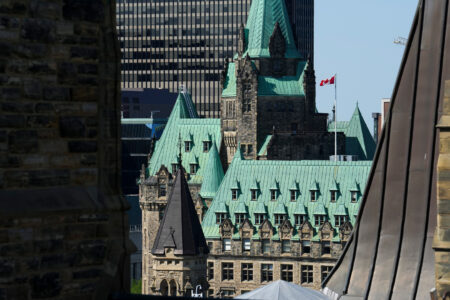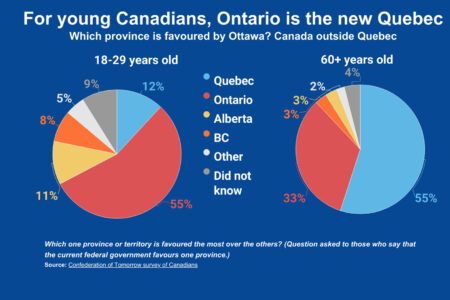
Everybody says the Canadian constitution is hard to amend. Not impossible, but hard. Since giving ourselves an amending formula in 1982 we have managed to eliminate confessional schools in both Newfoundland and Quebec. But that’s the exception that proves the rule. There’s been lots of talk about doing other things that would require constitutional change ”” such as giving Quebec a constitutional veto, abolishing the Senate, doing away with equalization, ending the monarchy ””but so far not much action. For the most part, the constitution remains as it was.
Or does it?
In the grand old British tradition ””pre-Tony Blair, that is ”” large parts of the constitution were unwritten. Many Canadians assumed we did away with that tradition in 1982, when we codified the laws that govern how we govern ourselves. But it turns out there may be more to the constitution than met the page during the final administration of Pierre Trudeau. In the last 15 years or so, we may have given ourselves a whole new economic constitution.
This thought came to mind as I read a recent piece by William Poole, the noted monetary theorist and president of the Federal Reserve Board of St. Louis, on rules for central banks. Poole writes: ”œI think it is true ”” I hope it is true ”” that in the United States today the idea that Congress or the Federal Reserve would deliberately aim for, or tolerate, a sustained inflation rate of, say, eight percent per year is now unthinkable. If so, the idea that the Federal Reserve has a responsibility to maintain low and stable inflation in the neighborhood of recent experience is approaching the level of constitutional force.”
What Poole means by ”œconstitutional force” is that ”œa law or practice cannot be changed without resort to lengthy discussion and, in the case of a law, by a super majority or its equivalent.” Very few laws and almost no constitutional provisions govern the conduct of Canadian economic policy, but I’d bet that in Poole’s very British sense of the term a couple of recently developed macroeconomic habits now have something like ”œconstitutional force.”
Since the mid-1990s the idea that governments shouldn’t run deficits except in emergencies, and may be even not then, has caught the public imagination. Or, to be precise, what large segments of the public have always believed has caught the imagination of economic and political elites, mainly because the rapid rise of the Reform Party made clear that any members of these elites who held public office must either engage their imaginations or soon find themselves out of public office.
The end of deficits, though not yet of debts, is a mixed blessing. Even non-elite economists concede it sometimes makes sense for governments to borrow. When public spending produces benefits that are longer lasting than a gourmet dinner for the Minister and friends at a fine Ottawa restaurant (a phrase that once was oxymoronic and that many ofus would like to see oxymoronic again) then it may make sense to ask future generations to help pay. Governments, even the one in Ottawa, do occasionally build things that last and it is not unreasonable to ask anyone who benefits from such things ”” bridges, national parks, clean air, a free and peaceful Iraq ”” to share in their finance.
By contrast, the supposed loss of counter-cyclical flexibility arising from the abandonment of deficits is overdone. What counts in counter-cyclical policy is the change in the deficit, not its level. If the federal government had a policy of putting $20 billion toward debt reduction in normal years and letting that target slide in years of macroeconomic softness ””when, say, the auditor-general formally diagnosed that condition ”” then letting the surplus fall from $20 billion to$5 billion or less would provide enough stimulus to offset most downturns.
Weighing in against these inconveniences is the great and ultimately overriding advantage that with a zero-deficit rule policy is bound, hard and fast. It does seem unlikely that the political class will ever again be allowed to build up our public debts to the levels reached in the 1980s and early 1990s. (I sincerely hope John Manley’s November budget update, not yet delivered as this was written, does not summarily end the no-deficit era.)
A second policy that now seems bound by a hard and fast rule is monetary policy. Since 1993 the Bank of Canada has officially aimed to keep the national inflation rate between none and three per cent per year and, on the whole, has done a reasonable job of it. Again, the big payoff is in certainty and predictability. A potentially very destabilizing actor has in effects worn itself to stability.
Time has a lot to do with what is thinkable and what isn’t. Barring the unexpected, a man who helped raise both pillars of our new economic constitution will soon take custody of them for a parliament or two. No doubt he has pride in his handiwork, but he is also a politician. Whether they do ultimately attain constitutional force depends very much on what he thinks we think of them. We should make clear we approve.







